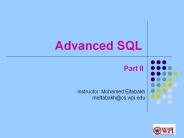Advanced Basic Procedure - PowerPoint PPT Presentation
1 / 23
Title:
Advanced Basic Procedure
Description:
... we can check pressure using a handheld electronic Tono ... number of fingers in each four quadrants while patient fixates on your nose Pupils To examine ... – PowerPoint PPT presentation
Number of Views:64
Avg rating:3.0/5.0
Title: Advanced Basic Procedure
1
Advanced Basic Procedure
2
Handheld Autorefractor
- Welch-Allyn SureSight
- Retinomax
3
- SureSight
- Important points
- make sure it is in the correct mode for child
or adult - Move the unit to lefft eye after to right eye
measurements - Remind the patient to look at the red light
- If confidence number is less than 6, retest eye
- Reprint if black boxes are on the printout.
- You can test a max of 3 times for each eye
4
- Retinomax
- Important points
- Dimming lights may help obtain adequate
confidence numbers - If the confidence level is less than 8, retest
eye - A confidence level of E is not a valid reading
- It may help to put your thumb on pt forehead and
place the forehead rest on your thumb instead of
directly above the pt brow.
5
- See handout for specific instuctions and
recording.
6
Drop Instillation
7
Tono-pen
- In the ER, or with patients who are difficult to
examine, we can check pressure using a handheld
electronic Tono-pen.
8
- Prepare patient by instilling a drop of topical
anesthetic onto the eye - Position patient in front of a fixation target
- Hold the tono-pen like you would a pencil
- Brace the heel of your hand on the patients
cheek for stability while hold the unit
perpendicular to and within ½ inch of the
patients cornea
9
- Depress operator button once
- Within 15 sec, Touch the unit to the cornea
lightly and briefly, then withdraw. Repeat
several times - A chirp will sound and IOP measurement will sound
- After four valid reading are obtained, a final
beep will sound and the average will appear
10
- http//youtu.be/bdVOItixpvo?t37s
11
- Calibration
- CAL followed by row of dashes ----
- Point the tip straight down towards the floor
- Hit operators button two times quickly
- Wait 15 sec for the beep and the display UP
- Then flip so the tip is directed to the ceiling
- Display Good or Bad
12
- http//www.youtube.com/watch?vAWamV6oIuasNR
13
Extraocular muscles(EOM)
14
- Check EOM in six positions of gaze right, upper
right, upper left, left, lower left, lower right.
One eye muscle is the prime mover in each
position of gaze.
15
(No Transcript)
16
- Right gaze is mainly moved by the right lateral
rectus muscle and the left medial rectus muscle. - Upper right gaze is by the right superior rectus
and left inferior oblique. - Upper left gaze is by the left superior rectus
and right inferior oblique. - Left gaze is by the left lateral rectus and right
medial rectus. - Left lower gaze is by the left inferior rectus
and right superior oblique. - Right lower gaze is by the right inferior rectus
and left superior oblique.
17
- Check EOM motility by asking examinee to watch
your light while keeping the head still, move
your finger across in H pattern, at a distance
about 10-14 inches away from the examinee. - http//youtu.be/vd7OOJ7c1q4
18
Confrontation Fields
19
Confrontation Fields
- Test peripheral vision
- Sit about 3 ft directly in front the patient.
- Ask patient to cover one eye while you close the
opposite eye - Present varied number of fingers in each four
quadrants while patient fixates on your nose
20
Pupils
21
- To examine the pupils, the level of the ambient
light should be reduced and, to relax
accommodation, the patient should be directed to
look at a distant object. Using a penlight
directed from below, just barely illuminating the
pupils, one inspects for symmetry in pupillary
size. The patient continues to view a distant
object, and each pupil is tested separately for
constriction in response to bright light. Also,
check the pupils with near-vision, as they should
constrict with accommodation.
22
- The penlight is then quickly moved from one pupil
to the other, shining light directly into each
eye (the "swinging penlight test" to elicit
afferent pupillary defect) In this test, one is
specifically looking for a pupil that dilates as
the light is first directed toward it,
demonstrating greater consensual than direct
response. The afferent pupillary defect is also
known as a Marcus Gunn pupil. - http//youtu.be/HSYo7LhfV3A
23
- If any discrepancy of more than 1 mm in pupillary
size is found, the pupils are measured in both
bright and reduced ambient light. Differences in
pupillary size (aniso-coria) tend to be
physiologic and not pathologic if such
differences are only 1 to 2 mm and remain the
same in differing levels of ambient light.





![[PDF] Study Guide and Procedure Checklist Manual for Kinn's The Clinical Medical Ipad PowerPoint PPT Presentation](https://s3.amazonaws.com/images.powershow.com/10101145.th0.jpg?_=20240816098)

























